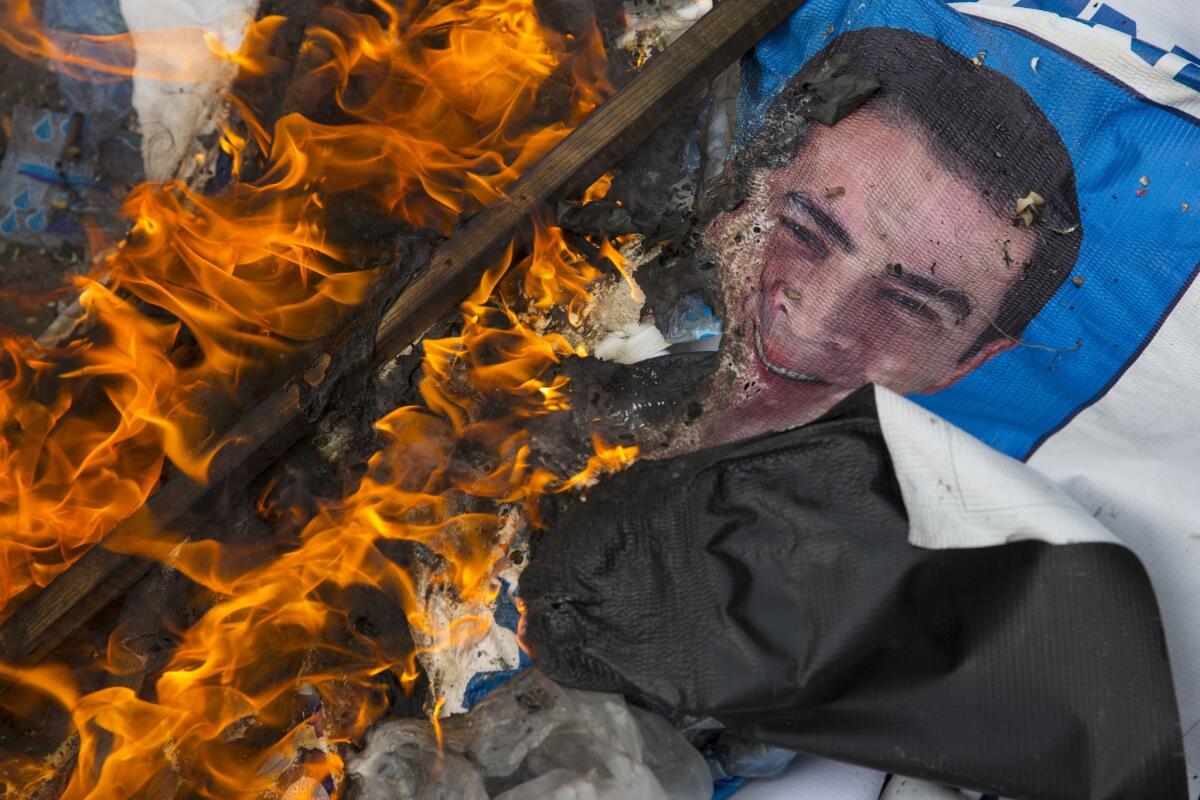U.S. implicates Honduran president in drug trafficking as it seeks his help on immigration

- Share via
WASHINGTON — Even as the Trump administration moved ahead on a controversial immigration agreement with the Honduran government, U.S. law enforcement has indicted another senior Honduran official on drug-trafficking charges that implicate the country’s president.
In charges filed Thursday in U.S. federal court in Manhattan, prosecutors accuse a former commander of the Honduran police of conspiring to import tons of cocaine into the United States and illegally using weapons and “destructive devices” to “violently protect” politically connected traffickers.
Known as El Tigre — the Tiger — Juan Carlos Bonilla Valladares long enjoyed U.S. support even as evidence of human rights atrocities and drug-running mounted against him.
The indictment alleges that Bonilla was operating on behalf of President Juan Orlando Hernandez and his brother Tony, who was found guilty in the same court late last year of running a multimillion-dollar “state-sanctioned” narcotics trafficking network.
The president, who has denied wrongdoing, has continued to maintain close relations with the White House and has been received in the Oval Office by President Trump on several occasions.
The reason appears to be Hernandez’s willingness to cooperate with controversial U.S. immigration measures.
One of those is an agreement signed in September in which Honduras pledged to accept non-Honduran migrants removed from the United States after being denied a chance at claiming asylum there.
On Thursday, the Trump administration took a step toward implementing that agreement by publishing it in the Federal Register.
The move comes as U.S. border authorities, citing coronavirus guidance from the Centers for Disease Control and Prevention, move to quickly expel thousands of Mexican, Honduran, Salvadoran and Guatemalan migrants, including, for the first time, asylum seekers and unaccompanied children.
The Trump administration appears to be moving toward relying more heavily on Honduras to take the migrants it doesn’t want. Guatemala recently stopped accepting them after officials there said over 100 of its nationals deported from the U.S. had tested positive for the coronavirus.
Normally, deportees must be returned to their home countries. But the administration has pressured some Central American nations to accept designation as “safe third countries.”
The strategy has drawn heavy criticism from migrant rights advocates.
“This would be illegal and inhumane at any time because Honduras is incredibly dangerous and lacks a functioning asylum system,” Yael Schacher, senior U.S. advocate for Refugees International, said in a statement. “In the midst of a global pandemic, with Honduras on lockdown and under a state of emergency, it is absolutely unconscionable.”
Last week, Trump announced he was providing ventilators to Honduras and El Salvador as they begin to grapple with COVID-19 cases — and pointedly left Guatemala off the list.
Critics of the Trump administration were quick to note the dichotomy between how it deals with the Honduran president on immigration and how federal prosecutors view him.
“Today’s news [reflects] the disconnect and contradictions within the administration,” said Adriana Beltrán, director of citizen security at the Washington Office on Latin America. “The rhetoric by the [White House] and U.S. officials painting Hernandez as a strong partner is counterproductive and damaging in terms of helping Honduras strengthen the rule of law and tackle corruption and other issues that are driving migration.”
The State Department did not respond to a request for comment.
Bonilla, 60, operated within Honduran security services from 1985 to 2016 — a period that included de facto military rule, the U.S.-backed, Honduras-based war against Nicaragua’s Sandinista government and more recent years of rampant corruption.
Hernandez has been president since winning election in 2013. He won a controversial second term in 2017.
Geoffrey S. Berman, U.S. attorney for the Southern District of New York, said in statement that Bonilla was operating on behalf of the Honduran president and the president’s brother when he “oversaw the transshipment of multi-ton loads of cocaine bound for the U.S., used machineguns and other weaponry to accomplish that, and participated in extreme violence, including the murder of a rival trafficker, to further the conspiracy.”
“Now Bonilla Valladares has been marked as an outlaw and charged with crimes that could send him to a U.S. prison for life,” the statement said.
Efforts to reach Hernandez, Bonilla or his attorney for comment were not immediately successful.
Bonilla, speaking to La Tribuna newspaper in Honduras, said he was surprised by the indictment and would be happy to testify in court. He said he had never engaged in drug trafficking and could document a long history of cooperation with U.S. authorities.
Human rights activists and others who have followed the long, tortured history of Honduras and its relationship with Washington cheered the indictment.
“For years, I and others warned U.S. administrations that General Bonilla was not to be trusted, based on reports implicating him in drug trafficking and other crimes, including murder,” Sen. Patrick J. Leahy (D-Vt.) said in a statement. “Those warnings were ignored, and our Embassy treated him as a credible partner. That was inexcusable.”
Leahy called for the State and Defense departments to reconsider delivering aid to a government “whose leaders are involved in corruption and violations of human rights.”
Dana Frank, an emeritus professor of history at UC Santa Cruz who has written extensively on Honduras, said the indictment offered “further and sickening evidence” that President Hernandez “not only took funds from drug traffickers and arms dealers in exchange for his election, but promoted a known death squad leader to the very top of the police at their behest.”
Times staff writer Molly O’Toole contributed to this report from Washington.
More to Read
Sign up for Essential California
The most important California stories and recommendations in your inbox every morning.
You may occasionally receive promotional content from the Los Angeles Times.











